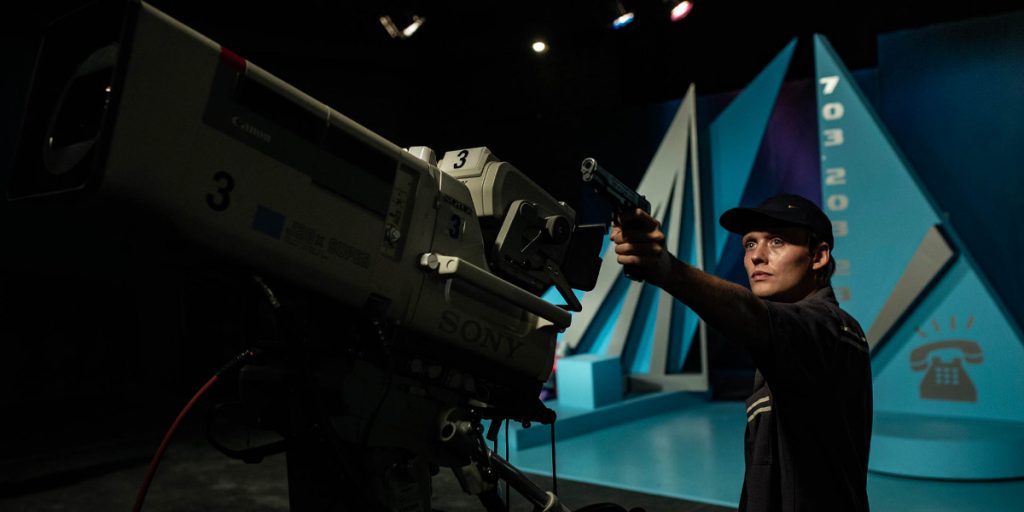Prime Time ’s effort to create a different kind of thriller falls short, never being as engaging and thought provoking as it could have been.
Prime Time has an interesting first few scenes: they immediately put our characters in a hostage situation which sets up the film from there on. With Bartosz Bielenia (a rising star since Corpus Christi) in the lead, viewers are prepared for something big. But the film’s strong start is only the height of what’s in store for us. Director Jakub Piątek’s approach to Prime Time falls apart as it unravels with a frustrating lack of suspense and sentiment. The idea behind Prime Time wishes to chronicle how hostage situations often get mishandled, but the screenplay is mishandles itself. While the film tries not to identify itself with the traditional tropes commonly seen in thrillers, the single location drama has a choppy plot, and no characters to fixate on. The end result is a film robbed of its potential, relying on performances to fill in the absence of excitement – and purpose.
The film commences during the final hours of New Year’s Eve 1999, a hostage situation has taken a newsroom by surprise. As the people outside celebrate the new millennium to come, the lone Sebastian (Bielenia) unsuspectingly barges in with a gun, locking himself in the studio room and taking two hostages with him: TV announcer Mira (Magdalena Poplawska) and security guard Daniel (Jan Hrynkiewicz). Both Mira and Daniel are not only caught off-guard, but find themselves defenseless in the scary scenario. But strangely, Sebastian isn’t looking for money. Instead, Sebastian demands to be broadcasted live on television, just for a few minutes. This unusual request becomes a difficult process, as the producers and executives prevent it from happening, putting Sebastian in constant delay. This stalling only causes the situation to get out of hand, generating uncertainty on how it will end for everyone.

The revolving conflict in Prime Time is not as much the terrorizing hostage situation but rather how everyone reacts to it. The TV producers are more preoccupied with how Sebastian’s broadcast could make them look like to the public, not showing too much concern for the safety of their trapped employees. They find ways to hinder Sebastian’s efforts, but by making him lose his patience, they put Mira and Daniel in more danger. But the self-interest goes all around: in a scene where Sebastian and the producers negotiate letting a hostage go, Mira and Daniel find selfish ways to be picked, with Daniel going as far as lying about having children to create sympathy for himself. The film flirts with this cynicism too much; it is a continuous cycle that slows the film’s progression.
The three main characters in Prime Time may have their moments, but they are unlikeable from the get go. Apart from not having any depth, Mira and Daniel’s negative traits makes it difficult to care about what will happen to them. As for Sebastian, who isn’t painted as neither a hero or a villain, he is too passive in his poorly thought up plan to get on the air. There is also virtually no backstory to his character that explains any clear motives he has. Through a brief conversation with his father, a troubled past is hinted at, and Sebastian occasionally calls his friend David, but it is never stated who David is (an accomplice? A lover?).
Given its flawed plot and characters, Prime Time can only rely on the performances. Bartosz Bielenia is colossal yet again, in only his second major film. He brings talent to the table and adds a layer of unpredictability to his character. Magdalena Poplawska does her contribution as the narcissist TV announcer, easily displaying Mira’s breakdowns and irritation. Both actors make the best use of their uninspired characters, but due to its limitations, Prime Time is not as gripping as it should be, and does not stimulate much thought with what it expresses.
Prime Time premiered online, at the 2021 Sundance Film Festival, on Saturday, January 30, 2021. The film will be screened again on February 1st.

